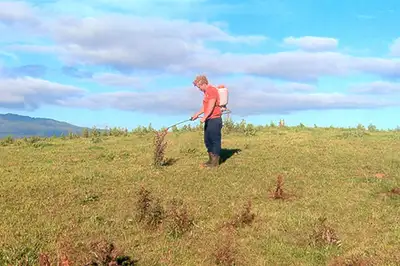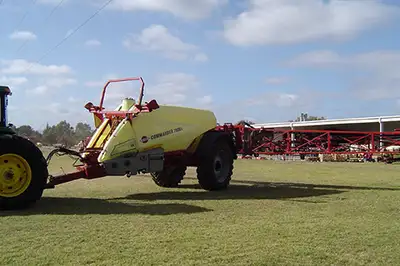Key facts
Start date: 5 May 2025
Cost: $1,800 + GST.
Duration: 10 weeks
Delivery mode: Online
Time commitment: Approximately 50 hours, including 2-hour open book exam
Overview
This course is designed primarily as a stand-alone course to give participants a good grounding in the principles of using herbicides to control weeds.

Who this course is for
People working in the herbicide industry within New Zealand. But is also useful for people working in agriculture, horticulture and regional councils who need to control weeds with herbicides as part of their job.
What you'll get
Successful participants will receive an official certificate of completion and the material will count as 5 credits at the 300 level towards a university qualification.
Learning outcomes
On successful completion a participant should be able to understand herbicides well enough to be able to select the most appropriate compound for any weed situation and obtain maximum effectiveness from that herbicide without causing damage to desirable plants.
Course content and structure
This course is online and uses course material and recorded lectures. Participants study at a time convenient for them between May and July, and an online, open-book exam is in July.
Topic 1 – Introduction
This topic will cover:
- an explanation of various things about the course
- introduce participants to various terminology about herbicides
- herbicide mode of action.
Topic 2 – Herbicide toxicity and legislation
This topic will cover:
- safety testing of herbicides
- relative toxicity of herbicides
- New Zealand legislation
- withholding periods
- the GROWSAFE scheme
- the 2,4,5-T and glyphosate controversies
- herbicide residues in food.
Topic 3 – Herbicide formulation
This topic will cover:
- solutions
- emulsions
- wettable powders
- granules
- dusts
- surfactants
- chemical drift through the air
- common and trade names
- calculations.
Topic 4 – Behaviour of herbicides in plants
This topic will cover:
- interception and uptake of foliage-applied herbicides
- availability and uptake of soil-applied herbicides
- transport of herbicides in the plant
- factors affecting these processes
- herbicide selectivity.
Topic 5 – Behaviour of herbicides in the soil
This topic will cover:
- adsorption
- volatilization
- leaching
- photochemical degradation
- chemical decomposition
- microbial decomposition
- rates of degradation of herbicides
- bioassays
- activity of soil-applied herbicides
- selectivity of soil-applied herbicides
- effects of weather on herbicides.
Topic 6 – Herbicide application
This topic will cover:
- Conventional spraying equipment
- calibration of a sprayer
- back-pack sprayers
- problems with conventional sprayers
- improvements in spraying equipment
- wiper applicators.
Topic 7 – Knockdown herbicides
This topic will cover:
- characteristics of importance in decision making
- broad-spectrum herbicides
- translocated knockdown of dicots in grass crops
- contact knockdown of dicots in grass crops
- selective knockdown of grasses in dicot crops
- sulfonylureas
- other knockdown herbicides.
Topic 8 – Residual herbicides
This topic will cover:
- Residual herbicides used primarily for non-selective control
- herbicides used primarily for depth protection
- selective residual herbicides which primarily control dicots
- selective residual herbicides which primarily control grasses.
Topic 9 – Economics of weed control
This topic will cover:
- when weeds reduce yields through competition
- when weeds exert indirect effects in pasture
- when weeds cause other effects difficult to measure
- how most weed control decisions are made.
Topic 10 – Weed control in pastures and lucerne
This topic will cover:
- problems caused by weeds
- keeping pastures competitive
- discouraging weeds that establish
- weed control in new pastures
- weed control in established pastures
- control of specific problem weeds
- clearing scrub weeds
- weed control in riparian plantings
- weed control in lucerne using management
- weed control in lucerne using herbicides.
Topic 11 – Weed control in annual crops or controlling environmental weeds, forestry weeds and urban weeds
This topic will cover:
- Obtaining weed control information
- cereals
- maize and sweet-corn
- forage brassicas
- fodder beet
- peas.
An alternative module will cover control of weeds in:
- forestry
- natural environments
- conservation estates
- aquatic environments
- urban environments.
Topic 12 – Herbicide resistance
This topic will cover:
- herbicide tolerance vs herbicide resistance
- development of herbicide resistant weeds
- factors affecting development of resistance
- mode of action coding system
- herbicide resistance in New Zealand
- managing herbicide resistance
- making use of herbicide resistance.

Meet your facilitator

Adjunct Associate Professor Kerry Harrington
Until his retirement in late 2023, Kerry was the weed science specialist at Massey University. As well as teaching aspects of weed biology, identification and control, he supervised postgraduate students and undertook his own research.
Registrations
Registrations for the 2025 course will open in January 2025. However, for enquiries or if you are wanting to be reminded once registrations open about this course, please email Kerry Harrington at K.Harrington@massey.ac.nz
Other short courses you might like
Intermediate Sustainable Nutrient Management in New Zealand Agriculture
This course will cover nutrient cycling, water movement, sustainable farm practices and nutrient budgeting.
Advanced Sustainable Nutrient Management in New Zealand Agriculture
This course will cover nutrient management, recent research and nutrient budgeting issues. You'll develop nutrient management plans that meet production goals for actual farm enterprises.
Farm Dairy Effluent: System Design & Management
This course focuses on the design, management and auditing of farm dairy effluent (FDE) systems.
Introduction to New Zealand's Agricultural Greenhouse Gas Emissions & Management
This course focuses on understanding greenhouse gas emissions from pastoral production systems and includes how to reduce and mitigate emissions.
Intermediate Freshwater Farm Planning
This course is designed for industry professionals interested in upskilling in the concepts and components important for the development of freshwater Farm Environment Plans.
Advanced Freshwater Farm Planning
This advanced course will provide participants with the knowledge and skills necessary to produce New Zealand industry-standard, farm-scale, freshwater Farm Environment Plans for dairy, beef and sheep and arable farms.
Analysis of New Zealand Agricultural Systems
This course will introduce participants to the scale and operation of agriculture and its importance within New Zealand.
Introduction to Life Cycle Assessment
This course will introduce you to life cycle thinking as a concept and Life Cycle Assessment as an analytical tool to support environmental management.